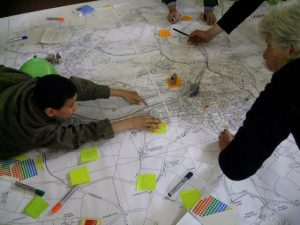 Between 2015-2018 Isabel Carlisle, working as Transition Network Education Coordinator, developed two programmes for schools that wanted to be part of this positive movement towards a low-carbon, local and sustainable future.
Between 2015-2018 Isabel Carlisle, working as Transition Network Education Coordinator, developed two programmes for schools that wanted to be part of this positive movement towards a low-carbon, local and sustainable future.
The pathway for secondary schools was piloted by KEVICC (Totnes in Devon), Crispin (Street in Somerset), Wellington College (Crowthorne in Berkshire) and Wellington Academy (Tidworth in Wiltshire). They were offered a package of support from published resources (the DVD of In Transition 2.0 and the Transition Streets workbook) to a weekend residential called Next Generation Leaders and follow-up mentoring. We went beyond the eco-schools territory to invite our schools to engage with a pedagogy (way of learning) that is aligned with an ecological world-view.
The funding to support this is now at an end and the report on what we did and how we did it can be found in the PDFs SiT 1 and 2 below. Our overall conclusion was that working with schools is not easy. It requires patience and dedication, as well as an understanding of how schools work. But that when it does succeed it is enormously satisfying and worthwhile.
See below for PDFs. SiT 1 is an overview of the work in secondary schools including interviews with teachers. SiT 2 is a how-to and case study of the Watershed Day with KEVICC. SiT 3 and 4 cover the food web mapping that we did with primary schools: there is an overview and a lesson plan. SiTs 5 and 6 are case studies of two primary schools.
Our goal was to explore how to bring about whole-school change and to see schools as Transition Communities in their own right. If you have been working with schools please write in and let us know what you have been doing. We are collecting resources that can be posted up here for educators across the world. Even though this programme is formally at an end there are many things you can do with a local school.
You could create a directory of local people and organisations that the school would like to build relationships with: bee-keepers, orchard-growers, organic farmers, bike-menders, composters, recycling everything, food hub (if there is one), local Transition community if there is one…… and invite these people into the school for Great Re-Skilling sessions. You could work with your local school to create maps of the area showing things like places to forage, places for locking up and repairing bikes, charity shops, recycling points, local food farms and shops, eco businesses, and green spaces.
Pupils can identify a project in the community that will add to the community’s resilience. It could be a local Incredible Edible project, it could be setting up a Food Hub, it could be a bike repair and ride project, it could be bee-keeping, cleaning up a waterway, clearing up a patch of waste ground and guerrilla gardening……
A school in Transition is:
- Relevant and specific to place and community: each school finds its own expression of that by mapping itself into a learning eco-system of relationships
- Pursuing resilience on many levels and making that explicit. It’s about whole-school change
- Adopting approaches to learning that put healthy eco-systems and social systems central and in doing so is re-visioning what education is for
- Involving pupils in its thinking, planning and doing as a matter of course. It’s all about designing for the future
- Applying minds to real-world problem-solving so that purpose and meaning are integral to the work. Solving local problems locally
For more information contact us at: info@transitionnetwork.org